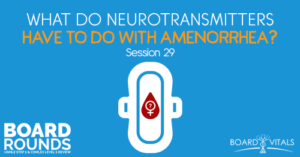Get 20% off a Single 1-on-1 Expert Advising Session Use it for ANYTHING! Learn More!

Which of these neurotransmitters is mostly likely causing this patient’s galactorrhea and secondary amenorrhea? Where is it coming from?
Dr. Karen Shackelford from BoardVitals. When you’re looking to prepare for your Step 1 or Level 1 board exams, check out how BoardVitals can help you. You can find all their amazing QBanks for Step1, Level 1, or even any of your SHELF exams. Use the coupon code BOARDROUNDS to save 15% off.
Listen to this podcast episode with the player above, or keep reading for the highlights and takeaway points.
A 34-year-old woman presents with amenorrhea for six months (secondary amenorrhea). Her menstrual cycles have been regular until this episode. She has, most of her life, a period every 28 days with a menstrual period that lasted three days.
Today, on exam, a white nipple discharge is noted. A test for urine hCG is negative. Which of the following neurotransmitters suppresses the release of the hormone responsible for her condition?
(A) Dopamine
(B) Insulin
(C) Serotonin
(D) Somatostatin
(E) Vasopressin
[Related episode: Why Is This Menstruating Patient So Sick?]
The correct answer here is A. If you think about the treatment for prolactinoma, where prolactin is released from the anterior pituitary, bromocriptine and cabergoline are used to shrink the prolactinoma. They’re both dopamine agonists.
The patient’s symptoms are suggestive of prolactinoma. It’s not totally obvious though as there wasn’t headaches or visual field issues mentioned. Nevertheless, prolactinoma is the most common of all pituitary adenomas. It’s also the most common cause of galactorrhea.
The clinical features include amenorrhea, galactorrhea, and infertility. The prolactin normally stimulates the mammary glands to produce milk and inhibits the secretion of gonadotropin-releasing hormone, which results in amenorrhea and infertility. With large tumors, like the compression of the optic chiasm that results in bitemporal hemianopsia.
Dopamine is normally used to suppress and release the prolactin. When you’re not breastfeeding after birth, this becomes an issue.
Insulin is produced by the pancreas and it’s necessary for the uptake and utilization of glucose.
Serotonin agonist is available in several classes, used as antidepressants. They’re used to treat migraines, but not for prolactinoma. Additionally, some antipsychotic agents interfere with prolactin.
Somatostatin is a hormone secreted by the pancreas that inhibits secretion of insulin and glucagon. It reduces the activity to digest the system. It’s not receptive to dopamine and not related to galactorrhea.
Vasopressin is an antidiuretic hormone and it’s not affected by dopamine agonist.
The key concept is that prolactinoma is probably the most common type of pituitary tumor and is the most common cause of galactorrhea.
The symptoms occur because prolactin stimulates the mammary glands and suppresses GnRH, causing amenorrhea and infertility. The dopamine agonist suppresses prolactin secretion and shrinks the prolactinoma.
BoardVitals (coupon code BOARDROUNDS to save 15% off)

Lorem ipsum dolor sit amet, consectetur adipiscing elit
I just received my admission to XXXXX! This is unreal and almost feels like I am dreaming. I want to thank you for all of your help with my application. I cannot overstate how influential your guidance and insight have been with this result and I am eternally grateful for your support!
IM SO HAPPY!!!! THANK YOU SO MUCH FOR ALL YOUR HELP, IM INDEBTED TO YOU! Truly, thank you so much for all your help. Thank you doesnt do enough.
I want to take a few moments and thank you for all of your very instructive, kind and consistent feedback and support through my applications and it is your wishes, feedback, and most importantly your blessings that have landed me the acceptance!
I got into XXXXX this morning!!!! It still has not hit me that I will be a doctor now!! Thank you for all your help, your words and motivation have brought me to this point.
I wanted to once again express my heartfelt gratitude for your help in providing feedback during my secondary applications. Your guidance has been instrumental in my journey.
Just wanted to share my wonderful news! I received my first medical school acceptance! Thank you for all that you do for us Application Academy!!!
I am excited to tell you that I just got my third interview invite from XXXXX today! I can’t believe it. I didn’t even know if I was good enough to get one, let alone three – by mid-September. Thank you so much for all of your help and support up to this point; I would not be in this position without it!!
I wanted to thank you for helping me prepare for my XXXXX interview. Even in a 30-minute advising session, I learned so much from you. Thank you for believing in me, and here’s to another potential success story from one of your advisees!
I just received an acceptance with XXXXX! This is so exciting and such a huge relief and so nice to have one of our top choice schools! I also received an interview with XXXXX which brings the total up to 20 interviews! Thank so much, none of this would have been possible without you!

Join our newsletter to stay up to date
* By subscribing you agree to with our Privacy Policy and provide consent to receive updates from our company.
Resources
Advising Services
Podcasts & Youtube
Books
About
"*" indicates required fields